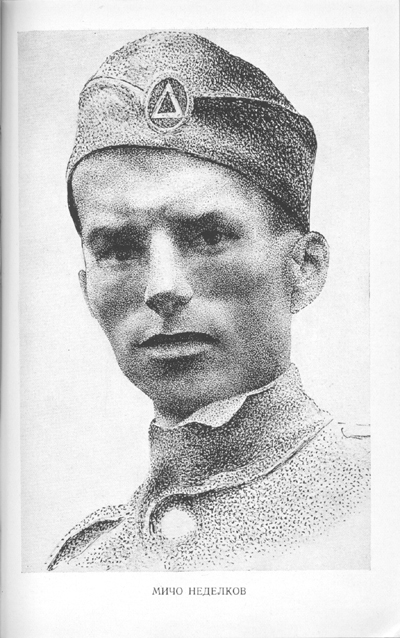
|
|
||||
|
|
||||
|
|
||||
|
|
Nedelkov MichoI heard about the life of Micho Nedelkov before I had met him. He was born in the village Banica, Lerin region in 1917. He worked in the fields as a young boy as was the situation with all young village children. At the time of the German occupation he fought for liberation of the Macedonian and Greek people. He became a member of the CPG and rose to the position of a local party activist. After the Varkiza agreement he was elected secretary of the Buf regional committee of CPG. When the second armed struggle began, he was among the first to step into the ranks of DAG. I saw him for the first time in the summer of 1948 during the great battles on Gramos. At the time he was a battalion commissar for the 14th brigade, which was holding the front at Alevica. On the second day of the operation the enemy bombarded the positions of the battalion with artillery fire and airplanes and his march began to move along all of our line, throwing the baggage to the left side. He climbed the pyramid above Grleni and began to attack one after another so that we could re-take the peak Nikoleri. Our side burst out with some attacks but because of the great press - the enemy had a great advantage - we were forced to withdraw. With two counter attacks they made ground against us. The position was more than critical. The major called the courier. "Run to Amuda. Tell the commissar to come here straight away."
He entered the best observation point. A sinewy, tall and muscular man - without much flesh on him. His liveliness made the biggest impression. He was all movement and nervous energy, his eyes shone and he had a pleasant, happy expression, which filled you with trust. "Micho! Listen to me so that you can understand the position. If they take Nikoleri and get out at Livadite… it is finished. The front is gone." Micho cast a look. It was as though the enemy had gone berserk and was bombing the pass close to the peak to stop us moving people and surging forward toward the pyramid of Grleni. It was clear that the enemy was preparing for another attack. The face of the commissar darkened. But that did not last long; just a moment. It was as though clouds were clearing from his face and he smiled - "It is bad. But we will not let them pass." "Take the reserves and go to Alevica." "No, no, I will not be able to get through there, I will go through the pass." "If we do not, it will not succeed." We saw them go through the enemy fire. When they heard the gunfire at a distance, they crawled along the ground. When there were explosions, we could not see them for the flames. And when the air cleared, we saw them run, he was at the front and the others after him in a military chain. At dark, when the hum of the battle stopped and all around an uneasy silence settled, he crossed the meadow. Happy. And even though the major was not a demonstrative man, the major hugged him and kissed him on the cheek. For that action on 1 August 1948 he was promoted to captain. I met him one more time. It was when the Cominform had published its decision about Tito. He had met the unit so that he could help resolve a disagreement between a Greek and a Macedonian. Turning to the Macedonian, he said - "What you are saying Trajko and more importantly, what you are doing, helps the deceivers because "Tito will liberate us... the Yugoslav Party is better…" these "theories" inflame chauvinism and will lead to our battle being lost." And later he turned to the Greek. "And you, Georgi, you have to know that the Macedonian people suffered a lot under the Greek reactionaries and you should expect that there are some who really can see the difference between the Greek people and the Greek reactionaries. We have to be very careful so that we do not destroy their national sentiment. Just calling out, "Hey, you slavo Macedonian," shows that you have not understood that. You turn upside down the theories that I spoke to Trajko about. The discussion went for quite a while. At the end, Georgi asked him - "Good, what are you? I thought you were a Macedonian." "I am, above all, a communist. And a communist has to put the revolution above everything else. Because only the revolution will solve the national social and other problems. Micho took part in all the battles in that sector. The penultimate day he was injured in Pampuri, if my memory does not deceive, he went to hospital and returned for the operations on Vich. On the peak "Nichova Cheshma" near the mountain Mali-Madi on 23 September 1948, he was badly wounded. "Leave me here in the guard so that I can observe from on high," he told the stretcher-bearers who arrived to collect him. And when one, wiping tears from her eyes, tried to persuade him that the wound was not bad, he told her - "Do not cry, comrade. That is how life is today. If some are not killed, if others do not suffer and cry, there will be no progress. And tell my mother, my wife and my child to be brave and to help better days come. When they lifted him up to put him in the stretcher, his head dropped to the side and he died quietly, in a dignified way, like a man who had honourably met his obligation to the people. K Purnaras
From: For Sacred National Freedom: Portraits Of Fallen Freedom Fighters © 2009 For Sacred Naational Freedom: Portraits Of Fallen Freedom Fighters |





